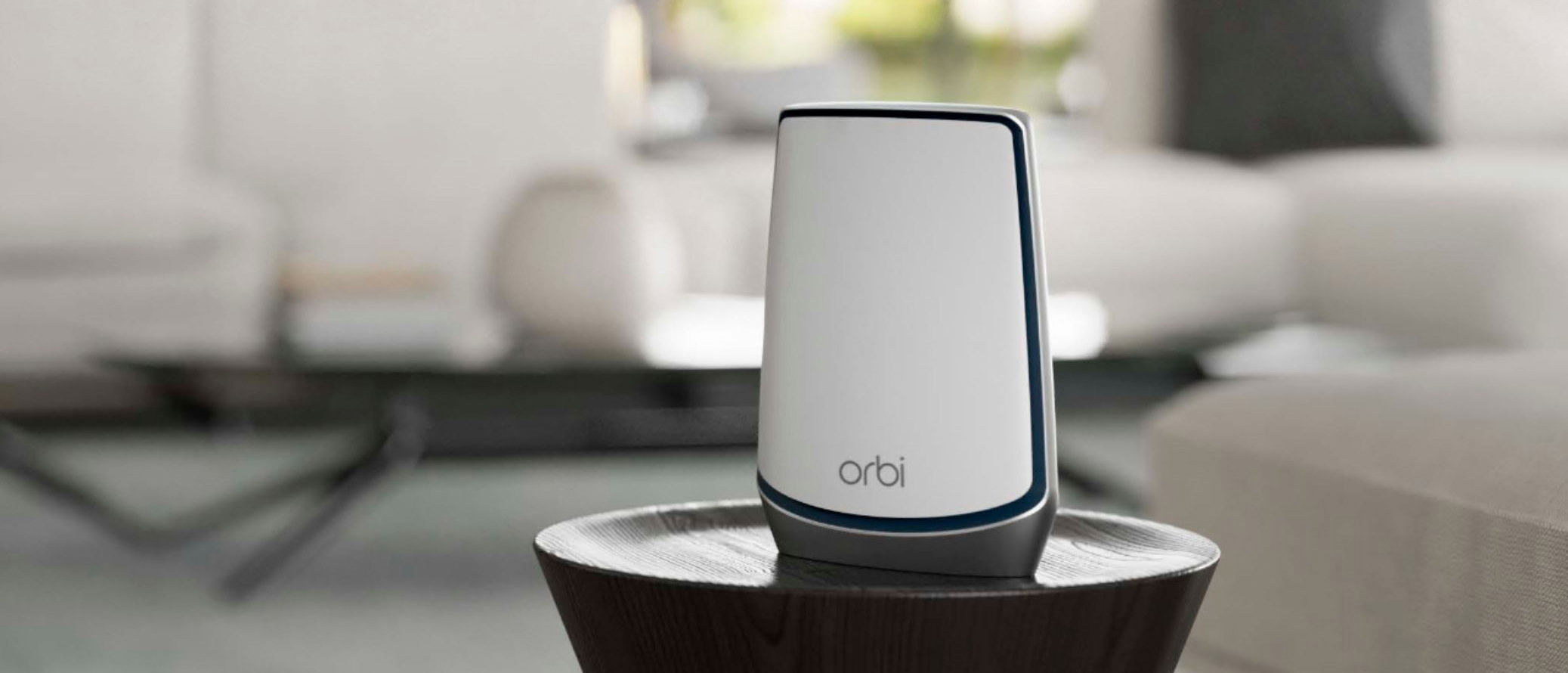Tom's Guide Verdict
The Netgear Orbi WiFi 6 (RBK852) brings the leading mesh networking kits into Wi-Fi 6 territory, pushing a strong signal throughout a digital home and adding an extra layer of security. It remains one of the most expensive mesh routing products, but it's worth every penny.
Pros
- +
Top Wi-Fi 6 mesh performance
- +
Malware protection
- +
Tri-band operation
- +
Excellent wall and ceiling penetration
Cons
- -
Very expensive
- -
Large
- -
90-day support policy
Why you can trust Tom's Guide
Wi-Fi Spec: AX6000
Number of Antennas/Removable: 8/No
Ports: Router – 1 WAN/4 LAN; Satellite – 4 LAN
Processor/Memory/Storage: Quad-core 2.2GHz/1GB/512MB
Wi-Fi chip: Qualcomm Networking Pro 1200/
Peak 802.11ax performance: 883.6Mbps (at 15 feet)
Range: 85 feet
Size: 10.0 x 7.5 x 2.8 inches
Estimated Annual Electricity Cost: $22.40
One of the first Wi-Fi 6 mesh networking kits available, the Netgear Orbi WiFi 6 (RBK852) takes its place at the top of the food chain, becoming one of the best mesh routers available.
Netgear’s two-piece Orbi RBK852 hits the mark for Wi-Fi 6 homes with a mix of good throughput, a dedicated backhaul channel for data from the satellites to the router as well as extra online security.
Far from perfect, the Orbi RBK852 is large and pricey – so expensive it may be a reach for some digital households. But if you want unbeatable performance throughout your home, it's one of the best Wi-Fi 6 routers you can get and one of the best mesh routers on the market. We even name it the mesh systems to get among the best gaming routers. Our Netgear Orbi WiFi 6 (RBK852) review proves that it's the Wi-Fi 6 mesh system to beat.
Editor's Note: We periodically update our reviews to make sure that pricing and information is up to date. The rating and recommendations in our Netgear Orbi WiFi 6 (RBK852) review is unchanged from when it originally published in November of 2020.
Netgear Orbi WiFi 6 (RBK852) review: Pricing and availability
It may seem like alphabet soup, but the RBK852 kit comes with two units: a preset RBR850 router and RBS850 satellite. They continue to use Orbi’s tri-band topology where data moves to devices on either the 2.4- or 5GHz bands and data travels back to the router over the system’s second 5GHz channel. This dedicated backhaul channel can potentially reduce congestion and data packets banging into each other.
It’s among the most expensive networking gear you can buy at $700 for the router and satellite that can cover about 5,000 square feet, according to Netgear. With the router and two satellites, the RBK853 kit costs $1,000. On its own, an extra RBS850 satellite costs $380.
The Netgear Orbi Wi-Fi 6 system is also available in a 3-pack and 4-pack, or you can purchase additional satellite add-on units individually.
Get instant access to breaking news, the hottest reviews, great deals and helpful tips.
- 2-Pack Orbi AX6000 Mesh WiFi 6 System (RBK852) - $699
- 3-Pack Orbi AX6000 Mesh WiFi 6 System (RBK853) - $999
- 4-Pack Orbi AX6000 Mesh WiFi 6 System (RBK854) - $1,299
- Single Add-on Orbi AX6000 Mesh WiFi 6 Satellite (RBS850) - $379
Available in packages of two, three or four units, the Orbi Wi-Fi 6 AX6000 system can cover a lot of area. The 2-pack seen in our review can cover up to 5,000 square feet, while the 3- and 4-unit packages cover 7,500 and 10,000 square feet, respectively. And if you find yourself needing more coverage, you can always expand your mesh system with an additional Orbi satellite unit, which adds 2,500 square feet of coverage to whatever Orbi AX6000 system it's added to.
And, since all of the Orbi Wi-Fi 6 AX6000 options are designed to operate with the same range and performance, we're confident in recommending any of these options just as strongly as we do the 2-pack featured in our Netgear Orbi WiFi 6 (RBK852) review.
Netgear Orbi WiFi 6 (RBK852) review: Design
Netgear updates its Orbi mesh networking kits for the Wi-Fi 6 (aka 802.11ax) era with the Home Tri-Band Mesh WiFi 6 System. It’s a lot easier to call it the RBK852. Like its predecessors, the RBK852 gear is big and continues with the tall, oval cooling tower look that makes them hard to hide. Both the RBR850 router and RBS850 satellite measure 10.0 x 7.5 x 2.8 inches, making them enormous compared to the likes of the TP-Link Deco X20 or Google Nest WiFi.
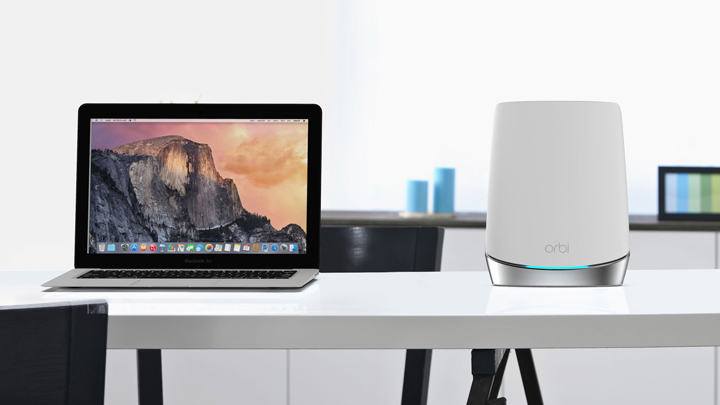
Still, the RBK852 devices can sit on a bookshelf or desk, but there’s no built-in provision for wall mounting them. However, Netgear breaks new ground by offering a wall mounting bracket ($19) for its devices, instead of relying on third party accessories.
Both the router and satellite have a single LED band near the bottom, serving as a status indicator. When the device is starting up, it blinks white and remains blue when data is freely flowing back and forth. When the light is purple, there’s something wrong because it is offline and requires attention.
Inside each unit are eight smart antennas that aren’t replaceable or aimable. With its Qualcomm Networking Pro 1200 chip, the router and satellite supports 4X4 streams of data. Using the latest MU-MIMO technology to support lots of connections and beamforming to tailor the signal to each device’s needs, the system is capable of moving a theoretical 6Gbps of data back and forth.
The router has a single 2.5 gigabit per second (Gbps) WAN input port for use with the newest modems. Both the router and satellite have four 1 Gbps LAN ports for connecting things like a printer and NAS storage, but no USB port. Both have a recessed reset button.
Netgear Orbi WiFi 6 (RBK852) review: Performance
The Orbi RBK852 uses Qualcomm’s newest Networking Pro 1200 Wi-Fi chip with 1GB of RAM and 512MB of capacity for storing firmware and settings. It’s all powered by a quad-core processor that runs at a maximum of 2GHz. It has an AX6000 rating.
Overall, the RBK852 set provided excellent throughput on most of our tests using Ixia’s IxChariot networking benchmark software, which created a busy Wi-Fi network in my 100-year old 3,500-square-foot home. It easily outpaced Wi-Fi 5 (802.11ac) and many Wi-Fi 6 routers.
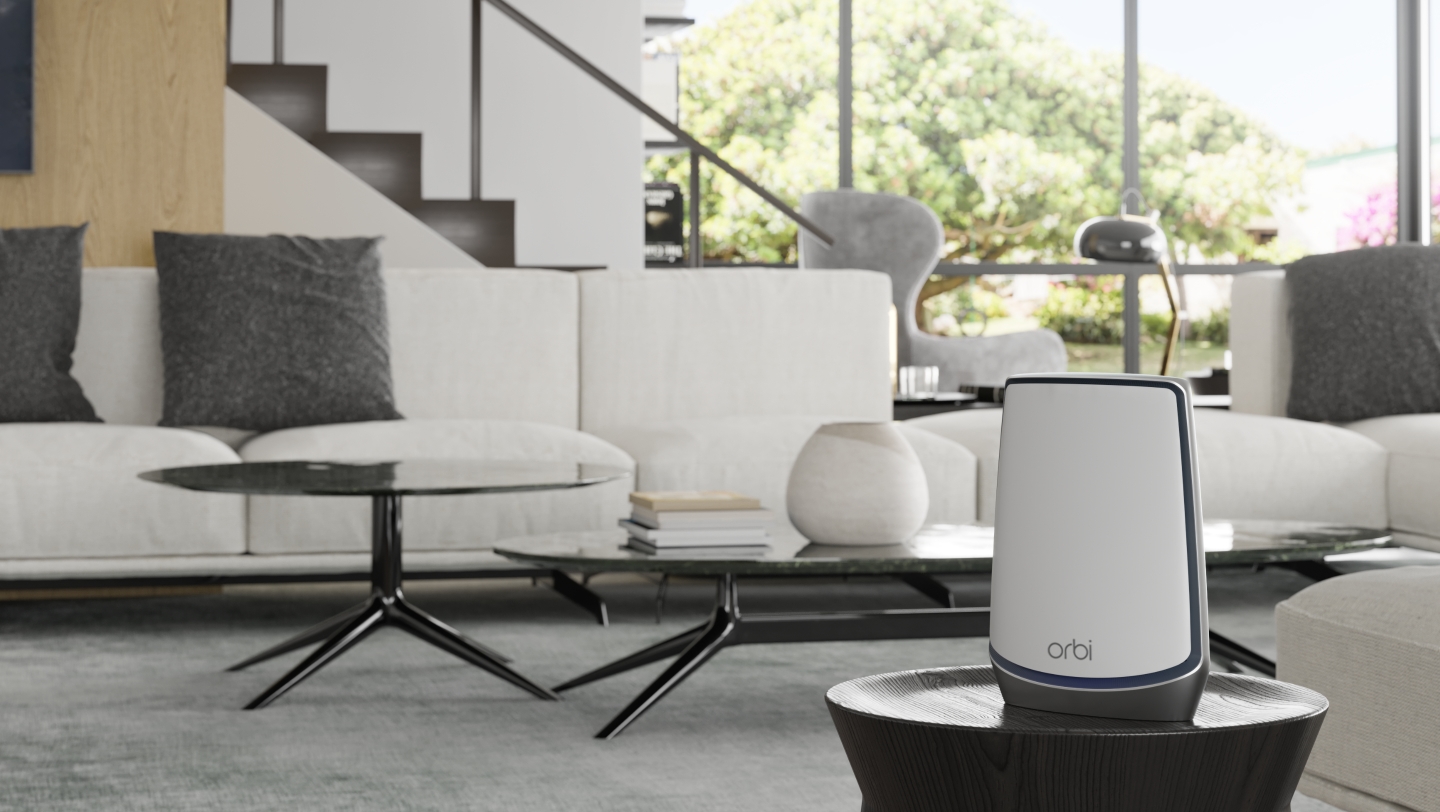
With just the RBR850 router set up, it moved 883.6Mbps to the receiving device 15-feet away. While this is off the pace set by high-performance routers, like the Netgear Nighthawk AX8 (RAX80) (at 1.389Gbps), it easily beat out other mesh kits, like the TP-Link Deco X20 (at 622.1Mbps) and the Arris SURFboard mAX Pro (at 820.3Mbps).
This throughput dropped off quickly to just 124.4Mbps at 50-feet, where the Deco X20 took the lead by sending 255.4Mbps to the test system. This throughput trend held up at 75-feet, where the Deco X20 still led with 112.7Mbps versus 85.9Mbps for the Orbi RBR850. It lost contact at 85 feet, 10-feet short of the Deco X20’s 95-foot range.
The Orbi RBR850 router’s ability to punch a strong signal through walls and ceilings was unequaled. It delivered 782.9Mbps through a wall 20-feet from the router and moved 670.1Mbps through a ceiling to a room directly upstairs from the router. By contrast, the Deco X20 could only manage 556.5Mbps and 320.5Mbps on the same tests.
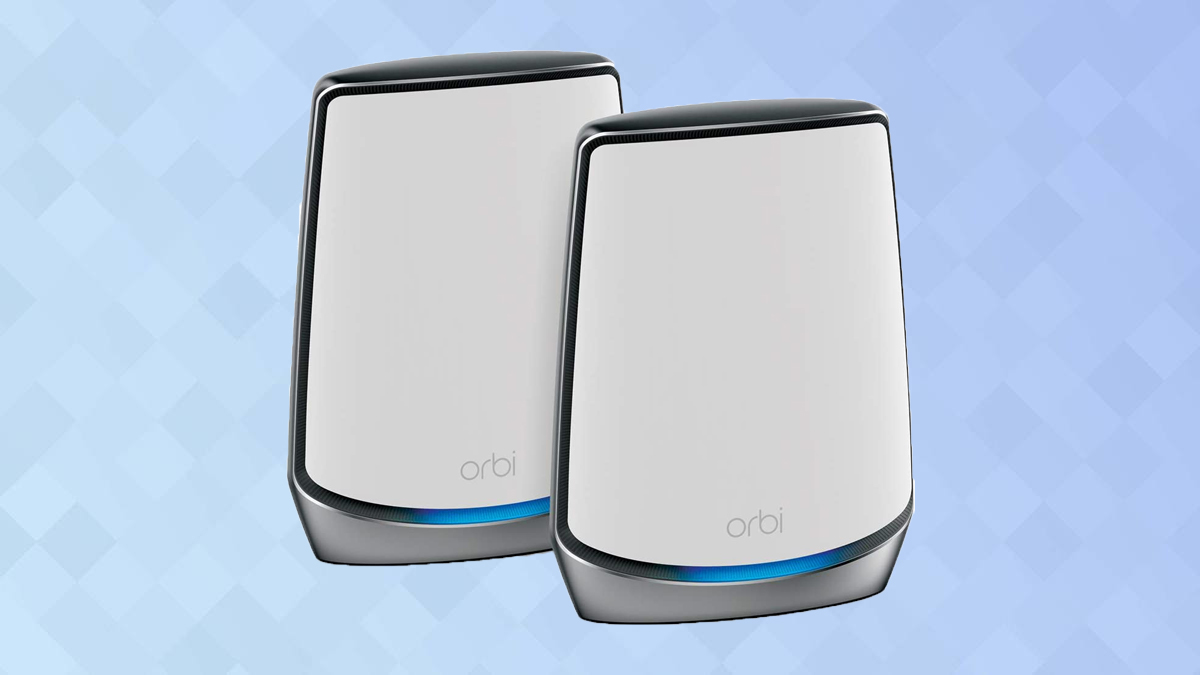
With the RBS850 satellite online, the mesh network came close to filling my 100-year old 3,500 square foot house. To start, with the satellite on the same floor but 40 feet away and the receiving test machine a farther 50-feet away, it delivered a disappointing 39.1Mbps, versus 125.8Mbps we saw in our Asus ZenWiFi AX (XT8) review. This rose to 405.5Mbps when the satellite was set up on a floor above the router and the test machine was 40-feet away. By contrast, the ZenWiFi AX pushed a similar 389.3Mbps. A third Orbi device might have done the trick at my home.
Over a week of heavy use, the RBK852 kit worked well for everything from watching a Twitch gaming feed to checking email to downloading large files. It passed our saturation test by delivering high-quality video to an iPad Pro tablet while a Macbook Air was playing an Internet radio station, a ThinkPad T470 was viewing videos and an HP dragonfly notebook moved data onto and off of a network-attached RAID storage system.
While the router used 11.2 watts and the satellite used 9.1-watts, the network is moderately expensive to operate. Its annual estimated cost for electricity is $24.40 a year if you pay the national average of 13 cents per kilowatt-hour of electricity. That’s about what it costs to use the Asus ZenWiFi AX kit, but $10 a year less than the Arris SURFboard Max two-piece kit.
Netgear Orbi WiFi 6 (RBK852) review: Setup
If you’ve ever set up an Orbi router, you’ll feel right at home with the RBK852. Like its predecessors, it uses Netgear’s Orbi app. If you’re new to Orbi, the app’s illustrated steps are easy to follow. There are apps for iOS-based iPhones and iPads as well as Android systems but both are vertically oriented with no way to use it in landscape mode.
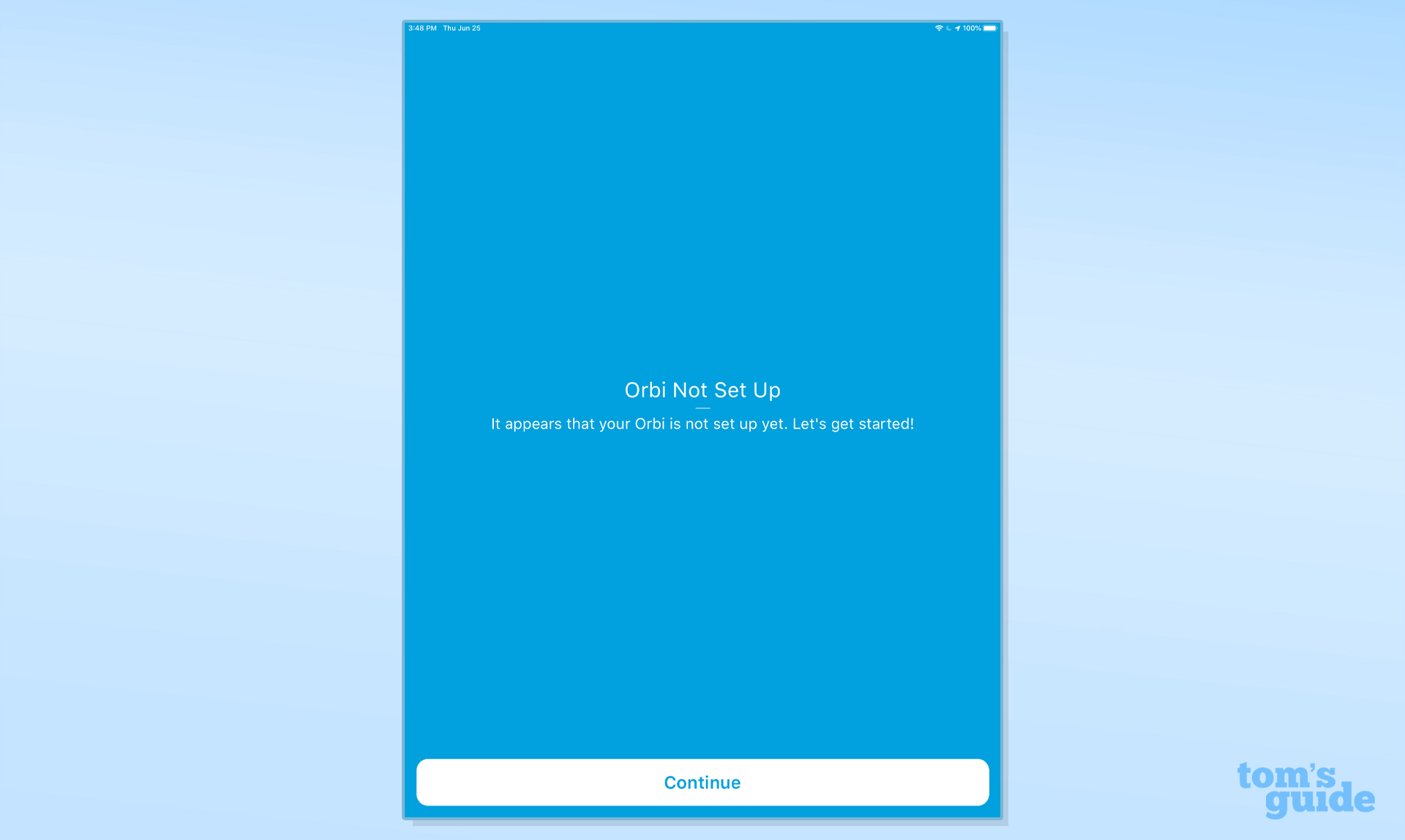
I started by plugging the RBR850 router’s AC adapter into a power outlet and its WAN port into my broadband modem using the included patch cable. Then, I plugged in the RBS850 satellite about 50-feet away. Using the network name and password printed on the router’s sleeve, I connected to it using my iPad Pro and fired up the Orbi app. After creating an account with Netgear, I snapped the QR code on the router’s sleeve to identify the device. After a minute, the app found the router and satellite.
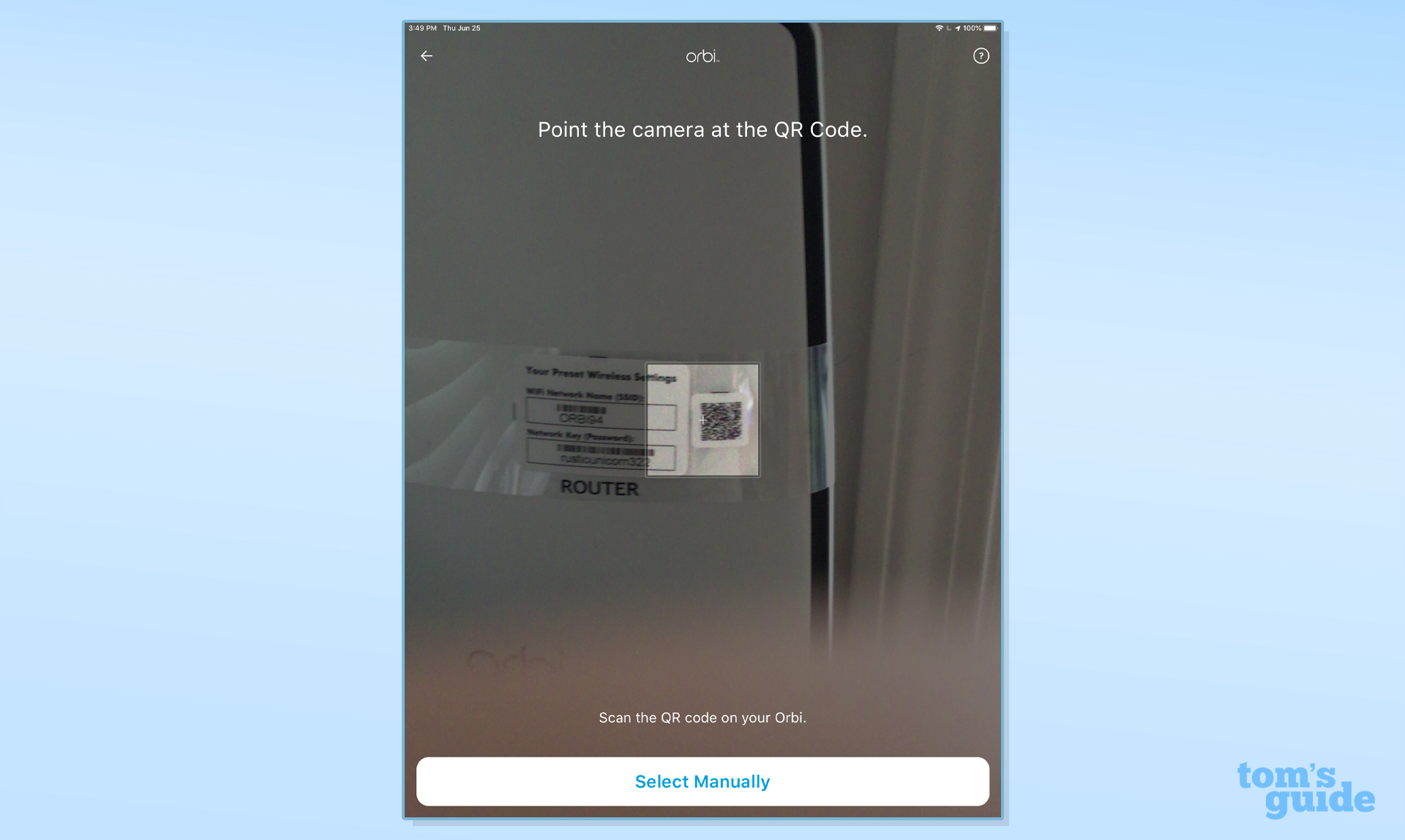
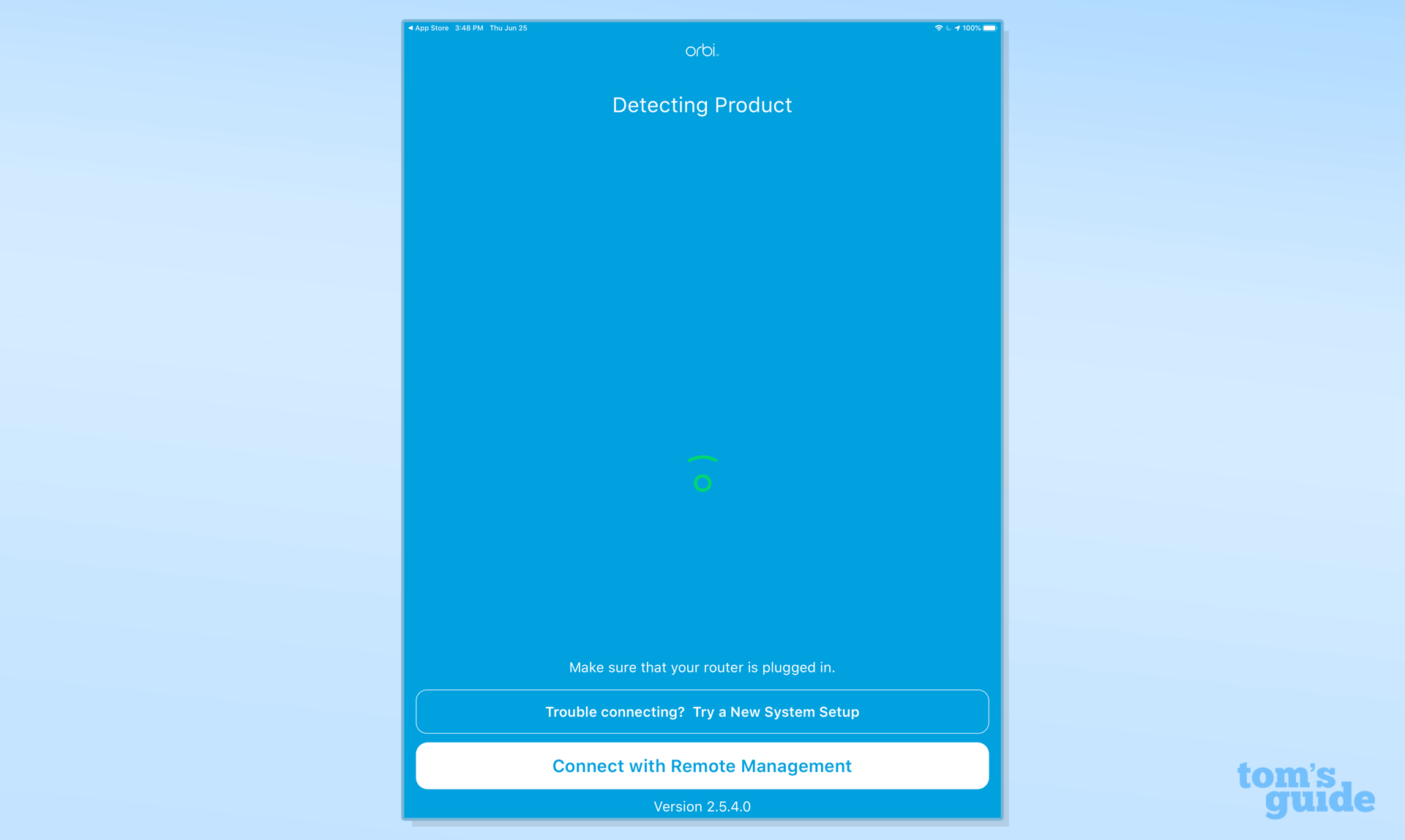
The app started its setup routine by asking me if I wanted to use the iPad’s TouchID to log in and require two-factor authentication for an extra layer of security. Happily, the system required that I change the administrative password. (Many don't, creating a big gap in security for users who don't know to change their passwords when setting up a new router.) This password change was followed by asking two verification questions.
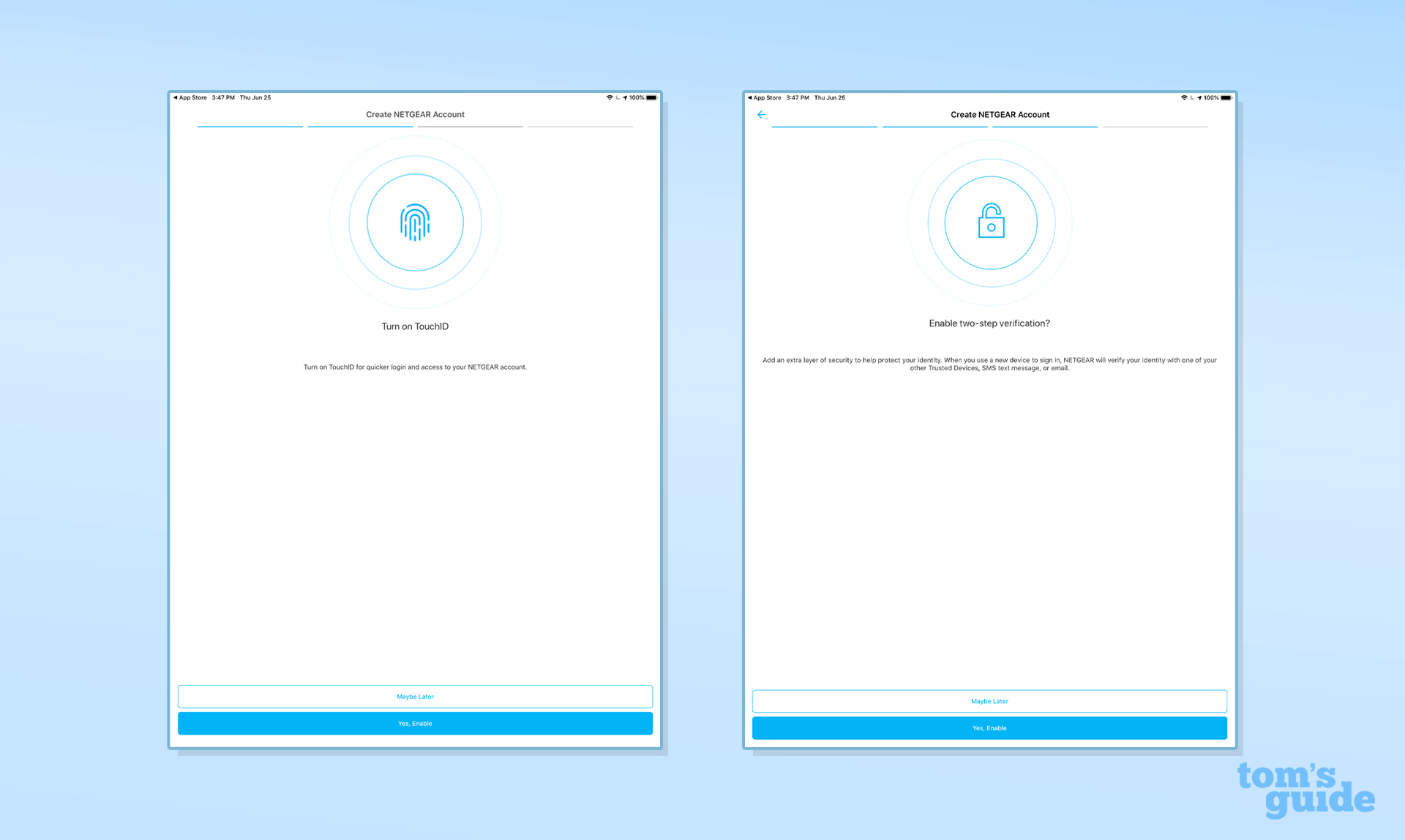
After restarting, the RBR850 base unit let me change the network’s name and password to something familiar and updated its firmware. Finally, it asked me if I wanted to add a satellite, which took a minute to find and configure. All told, it took 12 minutes to create a house-wide network and both the router and satellite worked on the first try. The router put out 185Mbps while the satellite managed 165Mbps from my 200Mbps connection.
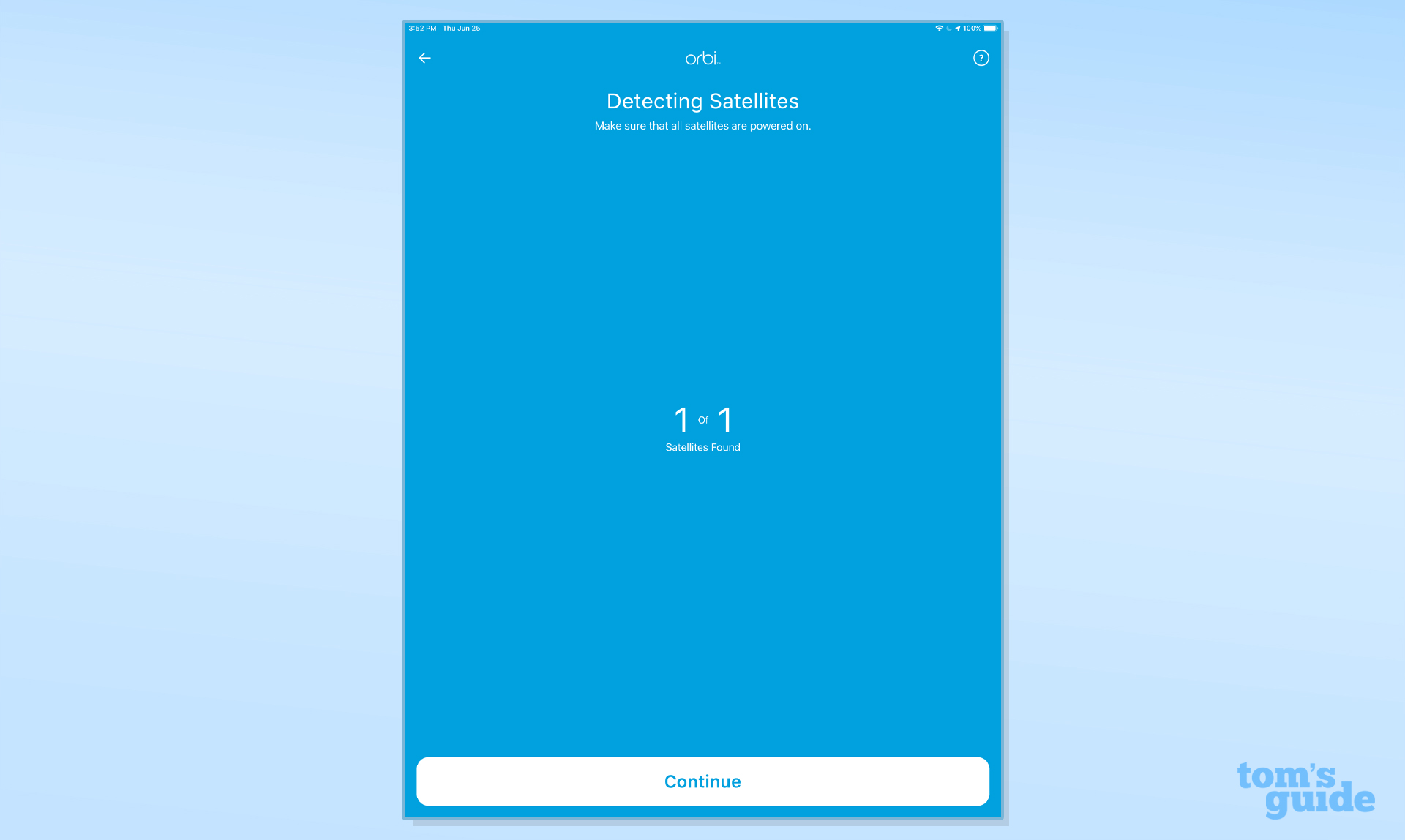
Netgear Orbi WiFi 6 (RBK852) review: Configuration
Like so many mesh kits and previous Orbi devices, the center of attention for making changes is the accompanying Netgear Orbi WiFi System app. Its Dashboard is easy to read and use but the app offers less configuration potential than using a connected browser.
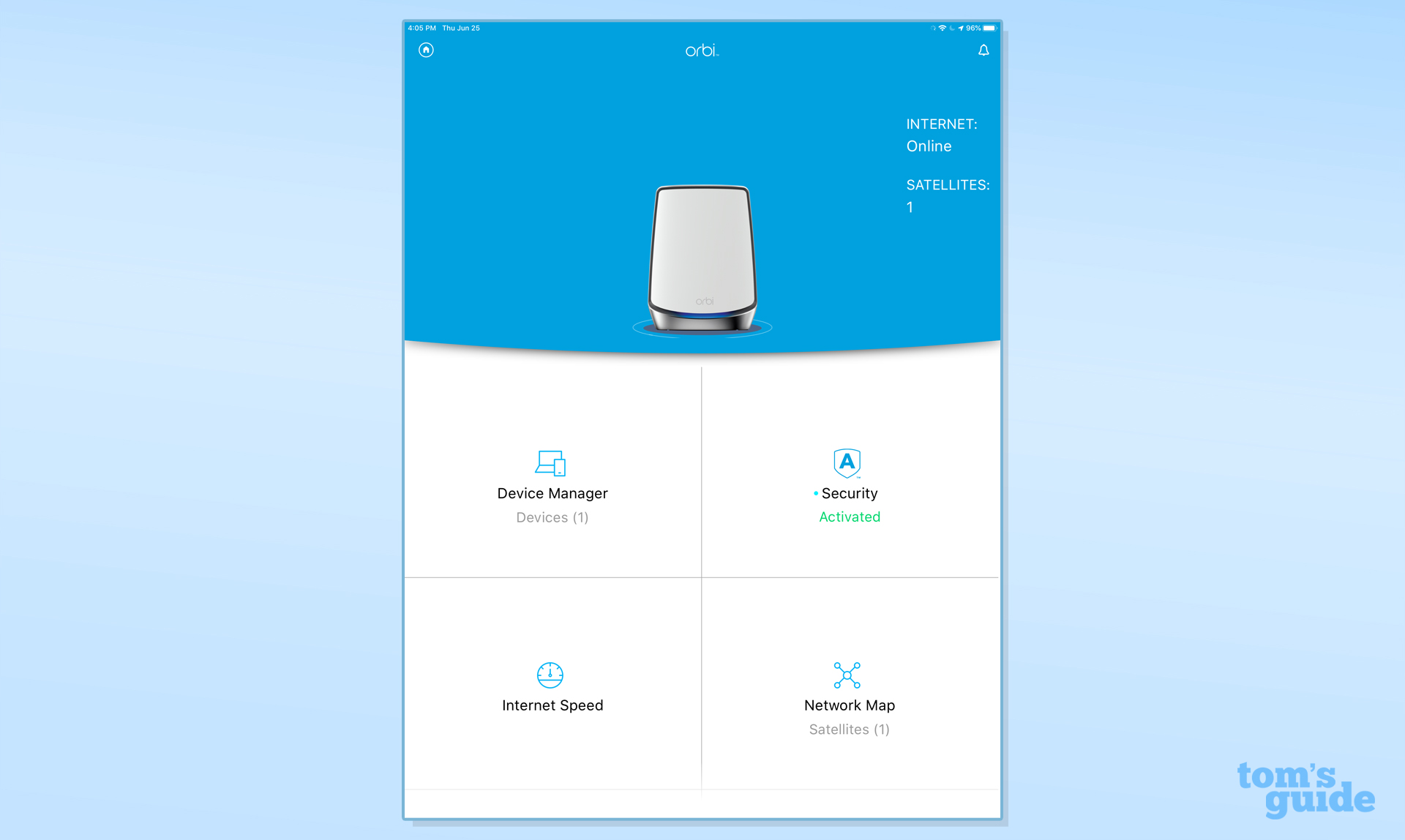
The app’s main screen shows the basics with the network’s online status as well as the number of satellites and connected devices. There’s a section for what’s connected and the included Armor security software. If you want to see how fast it’s running, tap the Internet Speed section to get a Web speedometer.
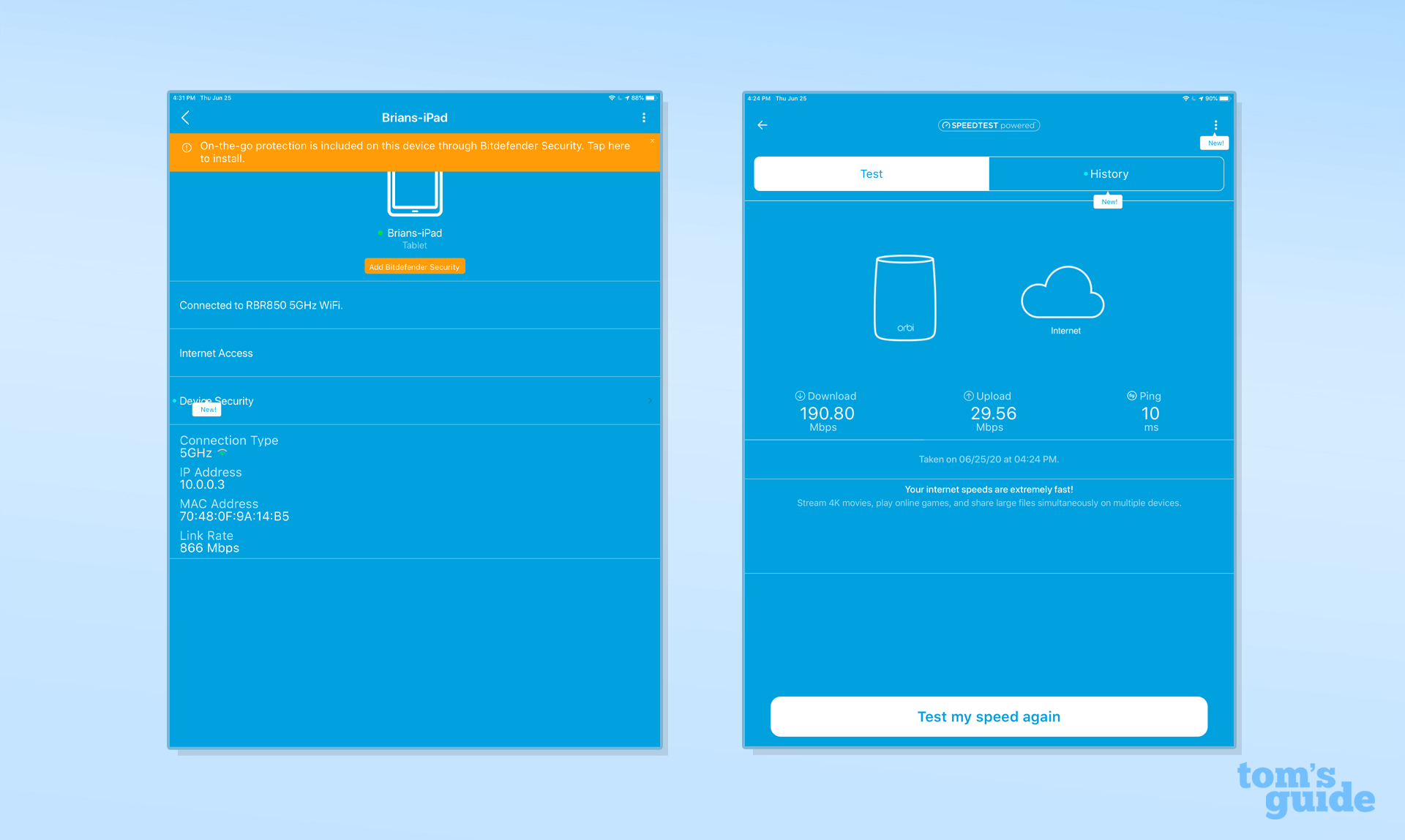
Dig a level down under the device security section and you can change the network’s name and password, or share that information via a QR code. There are tools for adding a satellite and rebooting the network, and there’s a place to update the system’s firmware.
To really get into the nitty gritty of the Orbi RBK852 kit, you need to log on via a Web browser interface. There’s a useful main page dashboard as well as Basic and Advanced sections. In other words, there’s something everyone.
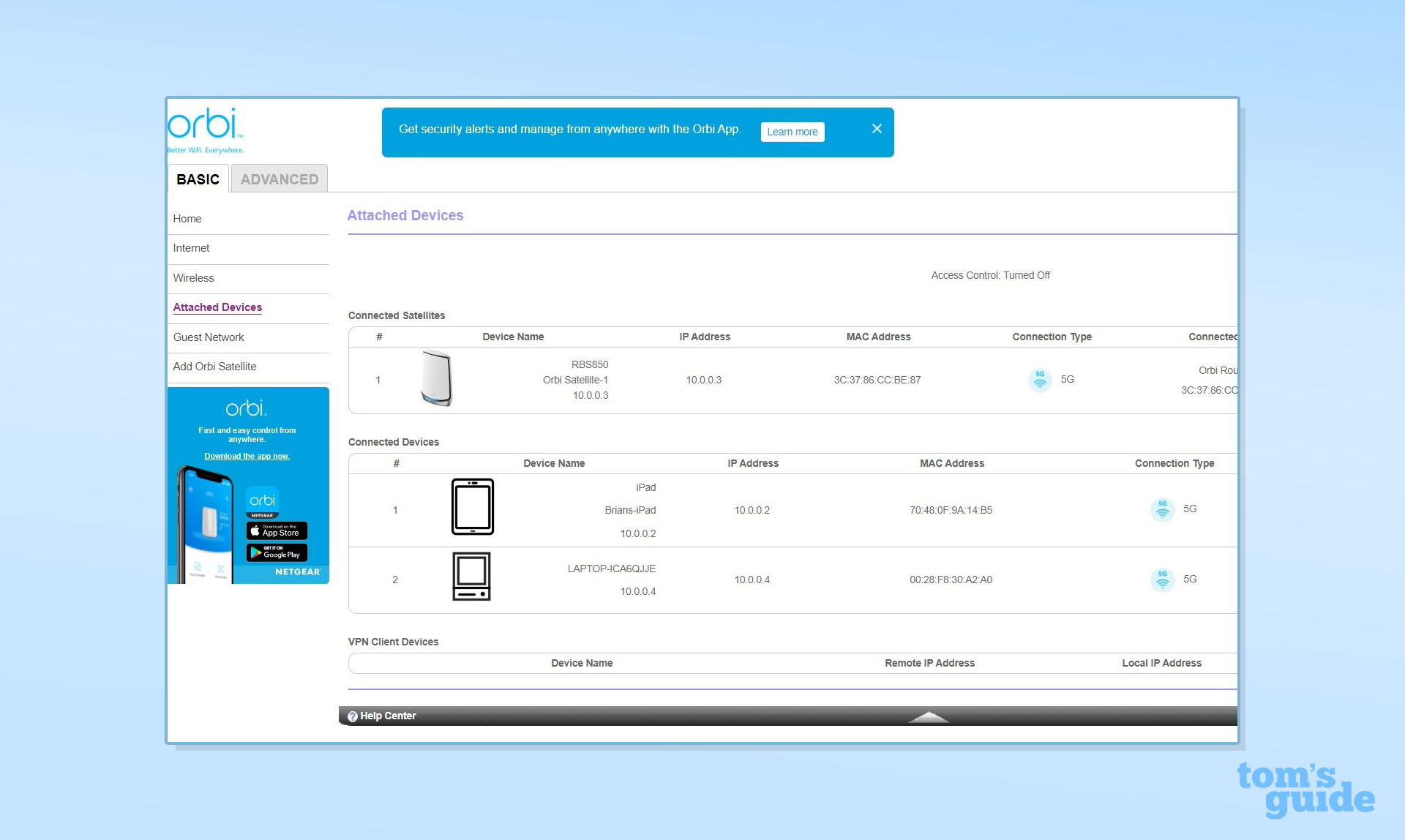
The categories in the basic menu include things like Internet, adjustments for IP address, port aggregation and Domain Name Server selection, as well as Wireless for changing the network’s name and password, data channels and the encryption method. The Orbi online interface lets you add an extra satellite in a step-by-step fashion.
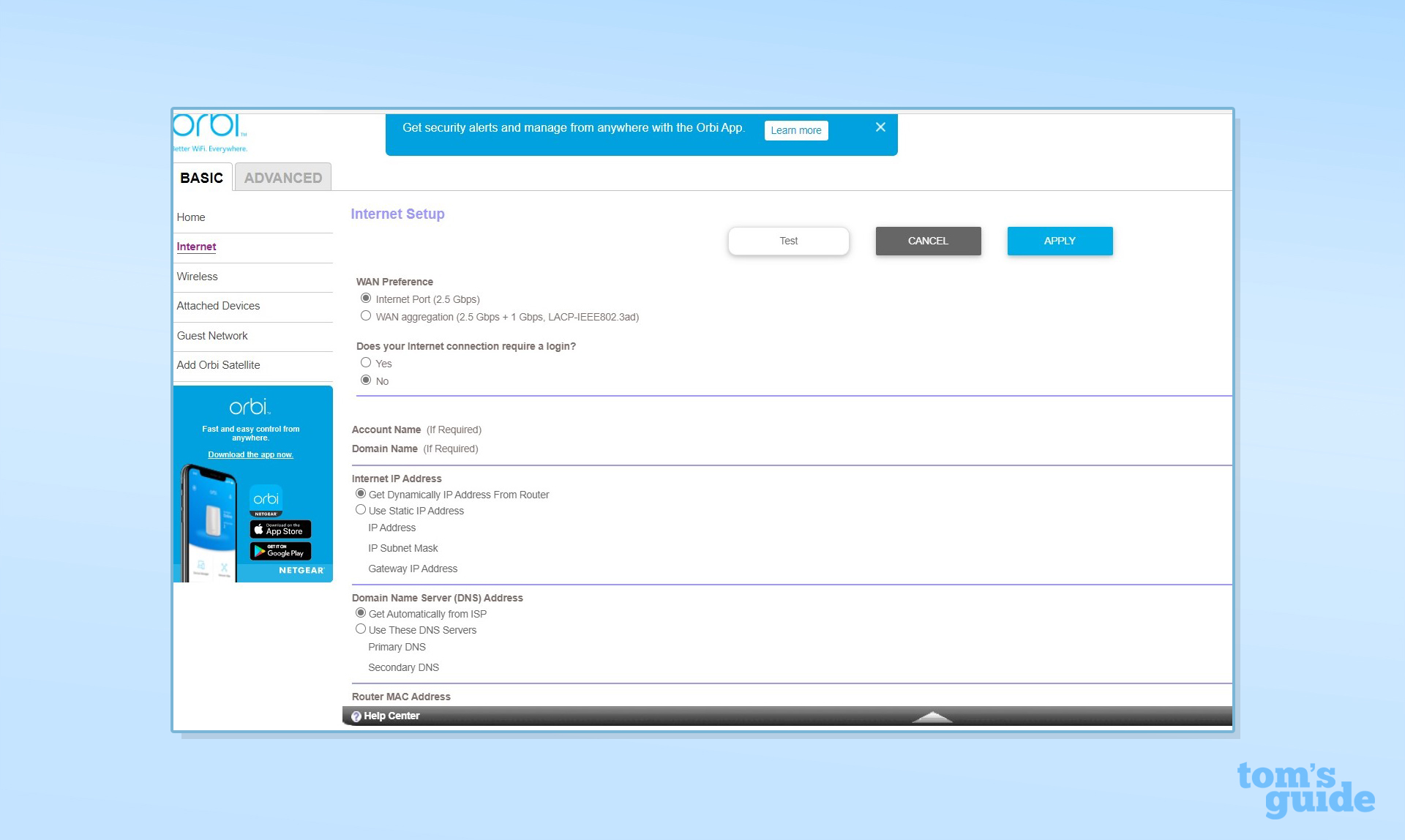
While many won’t miss it, there’s no provision for heavy duty optimization. In other words, forget about extending the data width to 160MHz channels or changing the fragmentation threshold. There’s also no provision for adjusting the transmission signal strength.
A big plus is that the Orbi RBK852 kit comes with the company’s Armor security package. With unlimited licenses for the equivalent of Bitdefender Total Security software, Armor can protect an entire family’s computers regardless of whether they’re PCs, Macs, Androids, iPhones or iPads. A year is included free, but after that it costs $70 a year.
Netgear’s one-year warranty is second best compared to the three-years of coverage offered by competitors like Linksys and D-Link. Plus, Netgear only provides 90-days of free customer support. It should be plenty of time to get the system up and running, but pales to its competitors. You can buy two years of warranty and support for $120.
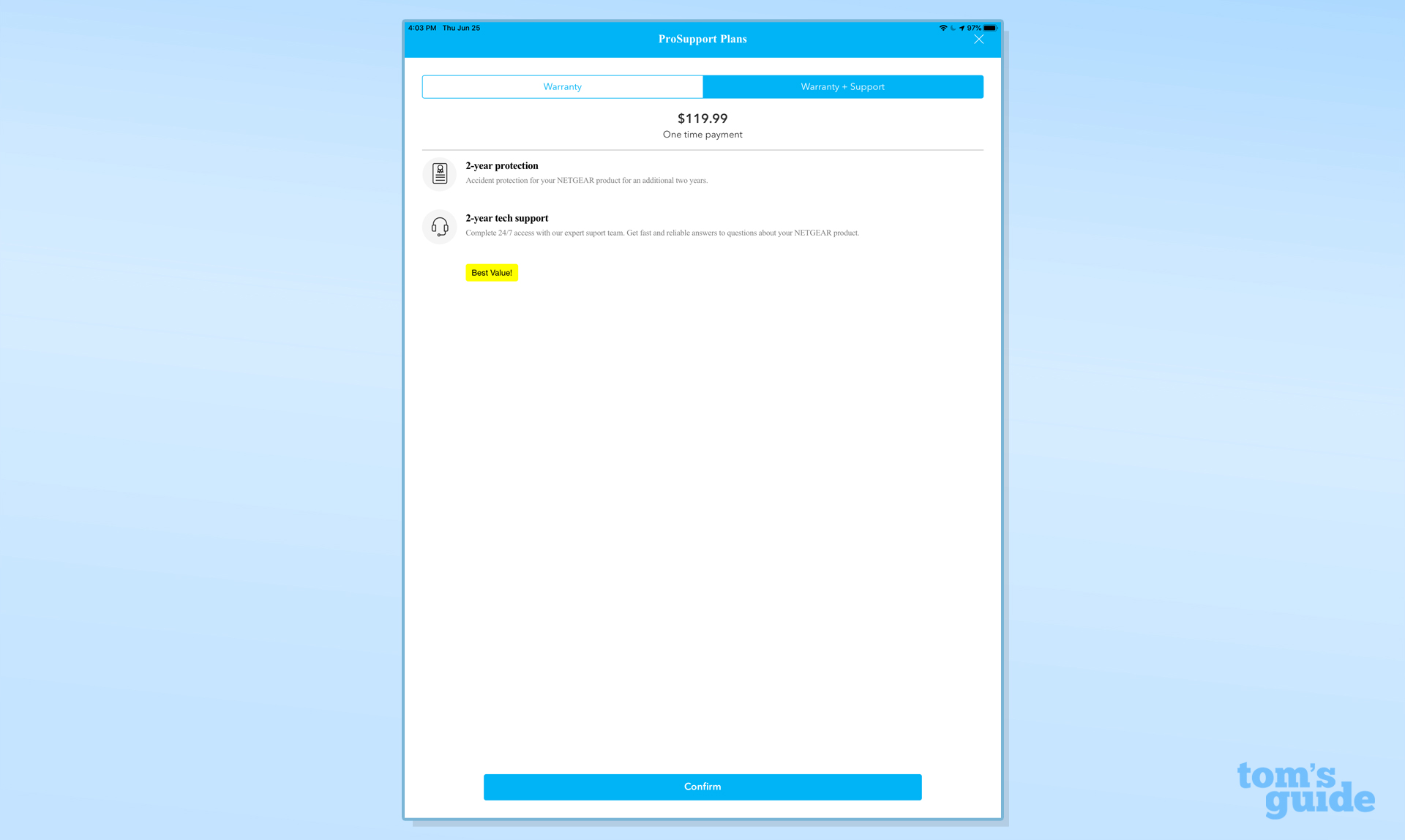
If you do need help, the support that Netgear provides is excellent. In addition to 24/7 access to helpful technicians, you can call, chat or email them.
There’s also a link in the Orbi app to get help that takes you directly to the Netgear support page, which is full of DIY assistance for troubleshooting and optimizing your mesh system. From a thorough manual and lots of FAQs to problem-specific articles and how-to videos, there's enough help offered for free that many customers won't need to worry about the 90-day window to speak to live reps.
Netgear Orbi WiFi 6 (RBK852) review: Verdict
If you’re looking for the easiest and fastest mesh networking kit on the market, the Netgear Orbi WiFi 6 (RBK852) does the trick with excellent performance, particularly for those in older homes with lots of walls. Its tri-band design with a dedicated backhaul data channel continues to be the best mesh approach and the RBK852 delivers on the promise of Wi-Fi 6, although each device is huge and you might need a third device.
The rare router that puts security first, the RBK852 combines Touch ID and two-factor authentication with malware software from Bitdefender to keep your online home squeaky clean. But, at $700 for the two-part kit, the RBK852 is one of the most expensive ways to distribute Wi-Fi at home and it only includes 90-days of support.
While larger and much more expensive than Google’s Nest WiFi mesh kit, the Netgear Orbi RBK852 brings Wi-Fi 6 technology and higher performance but lacks the Nest’s built in smart speaker and microphone; to get Orbi’s take on a mesh kit that listens to your commands and plays music you need to get the RBS40V Voice kit that, like Nest, still uses Wi-Fi 5 technology. As far as up to date gear goes, there are cheaper approaches from TP-Link’s Deco X20 but they fall short on performance. It may be costly and large, but the Netgear Orbi WiFi 6 (RBK852) kit is the leader in Wi-Fi 6 mesh networking by pushing data where it needs to be: everywhere.
Brian Nadel is a freelance writer and editor who specializes in technology reporting and reviewing. He works out of the suburban New York City area and has covered topics from nuclear power plants and Wi-Fi routers to cars and tablets. The former editor-in-chief of Mobile Computing and Communications, Nadel is the recipient of the TransPacific Writing Award.
